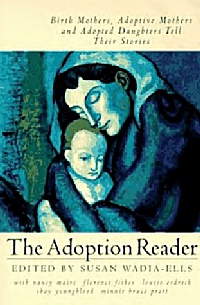
The Adoption Reader:
Birth Mothers, Adoptive Mothers and Adopted Daughters Tell Their Stories
Edited by Susan Wadia-Ells
Seal Press, 1995
The book’s strongest point is the wide variety of viewpoints reflected in the stories, including several lesbians, some who have had serious mental illness, Native Americans, Asians, and African-Americans. The editor’s adopted son is from India, as was her grandmother, so there is a diversity of cultural, ethnic, and socioeconomic situations represented in the book, as well as a wide age range.
One of the most unusual stories is that of two young women who were college roommates, both adopted, both of mixed black and white genetic background. One was adopted by black parents (one dark- and one light-skinned like herself, she reports) and raised with a darker adopted brother by their adoptive mother after the parents divorced. The other young woman was adopted and raised by a white family in a white neighborhood. As roommates and friends, they found their mirror in each other, and, over the years, forged an informal adoption of each other as sisters. At the time of writing, neither had initiated a formal search for birth parents, although the one whose black adoptive parents had both died had made a decision to search for both of her birth parents.
Some of the stories are painful to read, stories of mothers who had themselves been abused and found themselves emotionally incapable of being good parents, and who finally relinquished the children they had abused. Their grief and anguish, and the love they still have for their children, are aspects of adoption that we do not often consider, and may not want to think about, but these are honest women.
A more joyous story is that of a couple, both with cerebral palsy, who adopt a baby who has been diagnosed with cerebral palsy. Their careful decision to accept this challenge is beautifully written.
Several stories in the book concern international adoptions, under a variety of circumstances. Prospective adoptive parents could benefit from reading the stories in this book to consider possibilities. This would also be a good book to read at the beginning of a search, to help one prepare for whatever might be found, and to explore different points of view from all sides of the adoption triad. For readers not currently engaged in a search, or in the process of adopting, the stories in this book can broaden their own knowledge of various adoption situations.
O.I. Member
Excerpted from the October 1998 edition of the Operation Identity Newsletter
© 1998 Operation Identity